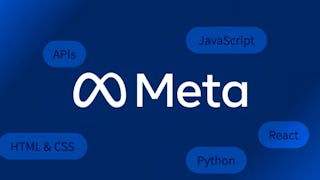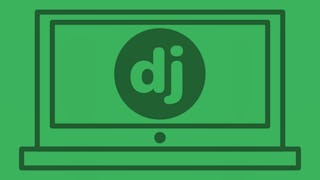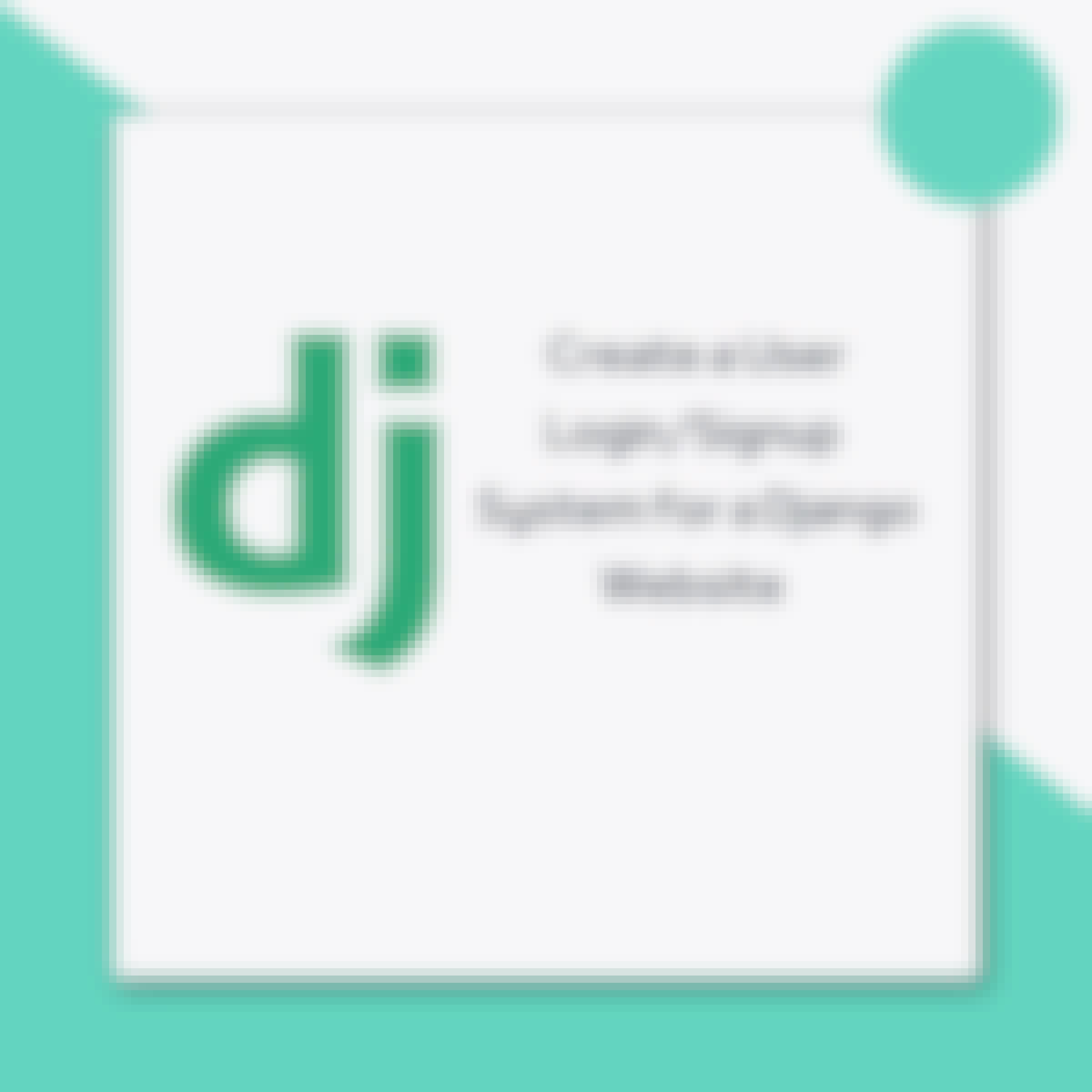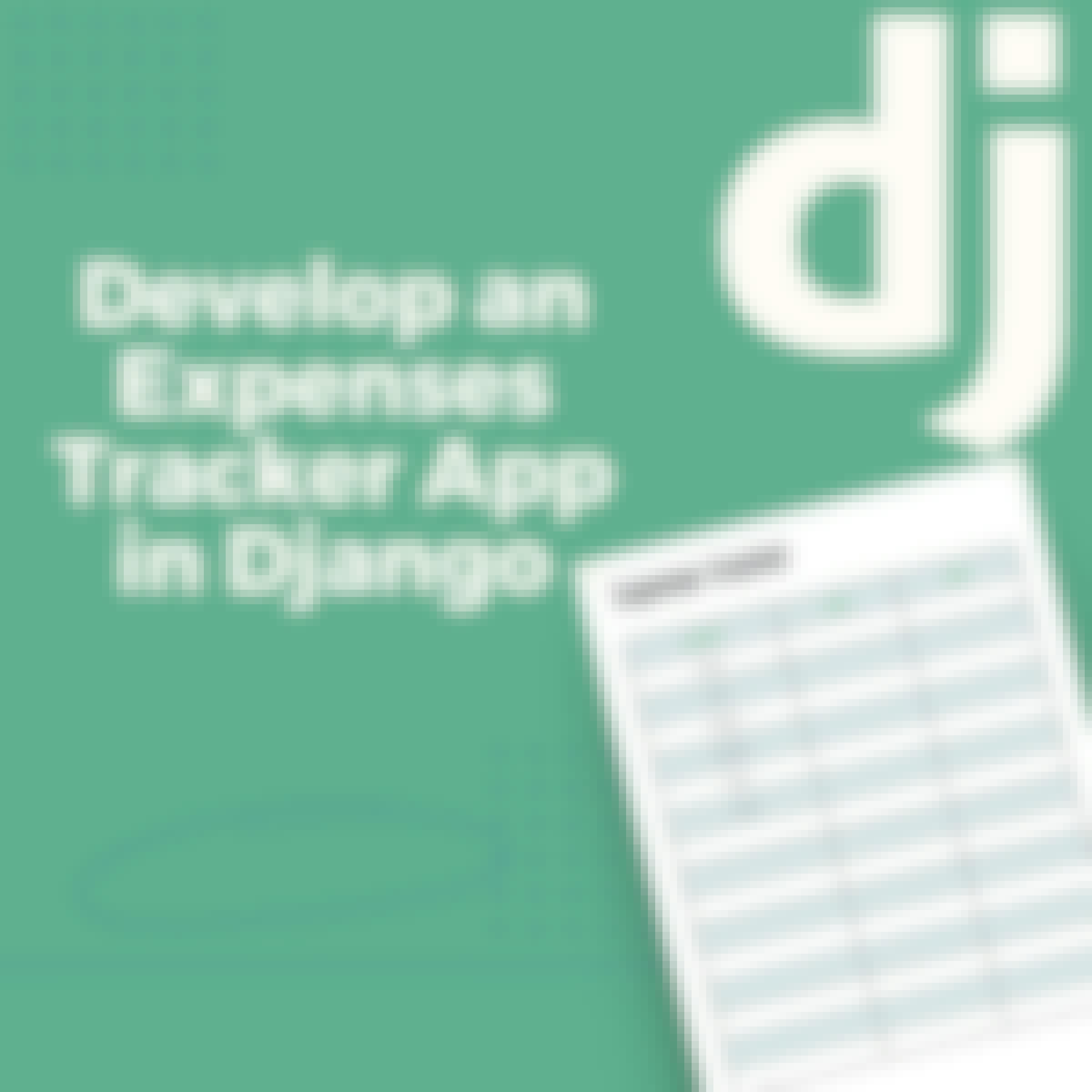- Browse
- Django
Django Courses
Django courses can help you learn web development, database management, RESTful API design, and user authentication. You can build skills in creating dynamic web applications, managing data migrations, and implementing security measures. Many courses introduce tools like Django REST Framework for building APIs, PostgreSQL for database management, and Git for version control, allowing you to effectively collaborate on projects and streamline your development process.
Popular Django Courses and Certifications
 Status: Free TrialFree TrialM
Status: Free TrialFree TrialMMeta
Skills you'll gain: Django (Web Framework), Web Development, Web Servers, Web Applications, Data Modeling, Back-End Web Development, MySQL, Application Security, Database Development, Model View Controller, Object-Relational Mapping, Application Frameworks, Database Management, Hypertext Markup Language (HTML)
4.7·Rating, 4.7 out of 5 stars663 reviewsBeginner · Course · 1 - 3 Months
 Status: Free TrialFree TrialU
Status: Free TrialFree TrialUUniversity of Michigan
Skills you'll gain: Django (Web Framework), Ajax, jQuery, Model View Controller, Cascading Style Sheets (CSS), Hypertext Markup Language (HTML), JSON, Linux Commands, Application Deployment, Database Design, Cloud Deployment, Web Applications, Application Development, Web Development, Javascript, Authentications, Web Servers, Data Modeling, SQL, Debugging
4.7·Rating, 4.7 out of 5 stars2.5K reviewsIntermediate · Specialization · 3 - 6 Months
 Status: Free TrialFree Trial
Status: Free TrialFree TrialSkills you'll gain: Jest (JavaScript Testing Framework), Django (Web Framework), Version Control, Restful API, Responsive Web Design, Cascading Style Sheets (CSS), Unix Commands, HTML and CSS, Git (Version Control System), API Testing, GitHub, Relational Databases, Object Oriented Programming (OOP), Database Management Systems, Bootstrap (Front-End Framework), React.js, Mobile Development, SQL, Database Design, Python Programming
4.7·Rating, 4.7 out of 5 stars25K reviewsBeginner · Specialization · 3 - 6 Months
 Status: Free TrialFree Trial
Status: Free TrialFree TrialSkills you'll gain: Django (Web Framework), Performance Tuning, Postman API Platform, Restful API, Application Programming Interface (API), Data Validation, Authentications, Frontend Integration, React.js, API Testing, Authorization (Computing), PostgreSQL, API Design, Scalability, Application Frameworks, JSON, Full-Stack Web Development, Frontend Performance, Web Development, Python Programming
4.6·Rating, 4.6 out of 5 stars160 reviewsAdvanced · Specialization · 3 - 6 Months
 Status: Free TrialFree Trial
Status: Free TrialFree TrialSkills you'll gain: Django (Web Framework), Object-Relational Mapping, SQL, Cloud Deployment, Bootstrap (Front-End Framework), Relational Databases, Database Management, Database Design, Full-Stack Web Development, Databases, Web Applications, Authentications, Model View Controller, Application Development, Authorization (Computing), Responsive Web Design
4.5·Rating, 4.5 out of 5 stars350 reviewsIntermediate · Course · 1 - 3 Months
 Status: Free TrialFree Trial
Status: Free TrialFree TrialSkills you'll gain: Django (Web Framework), Full-Stack Web Development, Version Control, Restful API, Data Structures, Unix Commands, Bootstrap (Front-End Framework), Git (Version Control System), API Testing, Back-End Web Development, GitHub, Relational Databases, Front-End Web Development, Object Oriented Programming (OOP), Database Management Systems, SQL, Database Design, Python Programming, Computer Programming, Cloud Hosting
Build toward a degree
4.6·Rating, 4.6 out of 5 stars9.8K reviewsBeginner · Professional Certificate · 3 - 6 Months
What brings you to Coursera today?
 Status: Free TrialFree TrialU
Status: Free TrialFree TrialUUniversity of Michigan
Skills you'll gain: Django (Web Framework)
4.7·Rating, 4.7 out of 5 stars785 reviewsIntermediate · Course · 1 - 3 Months
 Status: Free TrialFree TrialStatus: AI skillsAI skills
Status: Free TrialFree TrialStatus: AI skillsAI skillsSkills you'll gain: Cloud Deployment, Software Development Life Cycle, CI/CD, Cloud-Native Computing, Istio, Software Architecture, Node.JS, React Redux, Cloud Computing Architecture, Application Deployment, Restful API, Responsive Web Design, Django (Web Framework), Git (Version Control System), HTML and CSS, Server Side, Generative AI, Cloud Computing, Data Import/Export, Engineering Software
Build toward a degree
4.6·Rating, 4.6 out of 5 stars60K reviewsBeginner · Professional Certificate · 3 - 6 Months
 Status: NewNew
Status: NewNewSkills you'll gain: Scripting, Data Import/Export
Intermediate · Course · 3 - 6 Months
 Status: FreeFree
Status: FreeFreeSkills you'll gain: Django (Web Framework), GitHub, Version Control, Git (Version Control System), User Experience Design, Secure Coding, User Interface (UI), Web Development, Application Security, Application Frameworks, Development Environment, Authentications, Web Applications, User Accounts, Authorization (Computing)
4.6·Rating, 4.6 out of 5 stars11 reviewsIntermediate · Guided Project · Less Than 2 Hours
 Status: FreeFree
Status: FreeFreeSkills you'll gain: Django (Web Framework), Web Applications, Back-End Web Development, Expense Management, Application Development, Database Application, Data Visualization, Business Process Automation, Chart.js, Python Programming, Data Modeling, Data Security, GitHub, Javascript, Git (Version Control System)
4·Rating, 4 out of 5 stars6 reviewsIntermediate · Guided Project · Less Than 2 Hours
 Status: Free TrialFree TrialM
Status: Free TrialFree TrialMMeta
Skills you'll gain: Restful API, API Testing, Django (Web Framework), API Design, Software Documentation, Application Programming Interface (API), Authentications, Authorization (Computing), Debugging, JSON, Performance Tuning, Data Validation, Extensible Markup Language (XML)
4.4·Rating, 4.4 out of 5 stars372 reviewsIntermediate · Course · 1 - 4 Weeks
In summary, here are 10 of our most popular django courses
- Django Web Framework : Meta
- Django for Everybody: University of Michigan
- Meta Full Stack Developer: Front-End & Back-End from Scratch: Meta
- Advanced Django: Mastering Django and Django Rest Framework: Codio
- Django Application Development with SQL and Databases: IBM
- Meta Back-End Developer: Meta
- Building Web Applications in Django: University of Michigan
- IBM Full Stack Software Developer: IBM
- Python Mastery: Build Web Apps, Automate Tasks & Explore AI: Packt
- Build a user login system for a Django website: Coursera
Frequently Asked Questions about Django
Django is a high-level Python web framework that encourages rapid development and clean, pragmatic design. It is important because it simplifies the process of building robust web applications by providing a structured way to handle common web development tasks, such as database management, user authentication, and URL routing. With its emphasis on reusability and the principle of 'don't repeat yourself,' Django allows developers to focus on creating unique features rather than reinventing the wheel.
With skills in Django, you can pursue various job roles in the tech industry. Common positions include web developer, backend developer, software engineer, and full-stack developer. Companies often seek individuals who can build and maintain web applications, manage databases, and integrate APIs. As Django is widely used in startups and established companies alike, proficiency in this framework can open doors to numerous opportunities in web development.
To learn Django effectively, you should have a solid understanding of Python, as Django is built on this programming language. Familiarity with HTML, CSS, and JavaScript is also beneficial, as these technologies are essential for front-end development. Additionally, knowledge of databases and SQL will help you manage data within your Django applications. Understanding web development concepts, such as HTTP and RESTful APIs, will further enhance your learning experience.
Some of the best Django courses online include the Django for Everybody Specialization and the Advanced Django: Mastering Django and Django Rest Framework Specialization. These courses provide comprehensive training, covering everything from the basics to advanced topics, ensuring you gain a well-rounded understanding of Django and its applications.
Yes. You can start learning Django on Coursera for free in two ways:
- Preview the first module of many Django courses at no cost. This includes video lessons, readings, graded assignments, and Coursera Coach (where available).
- Start a 7-day free trial for Specializations or Coursera Plus. This gives you full access to all course content across eligible programs within the timeframe of your trial.
If you want to keep learning, earn a certificate in Django, or unlock full course access after the preview or trial, you can upgrade or apply for financial aid.
To learn Django, start by enrolling in an introductory course that covers the basics of the framework. Follow along with hands-on projects to apply what you learn. Utilize online resources, such as documentation and tutorials, to deepen your understanding. Join community forums or groups to connect with other learners and seek help when needed. Consistent practice and building your own projects will reinforce your skills and boost your confidence.
Typical topics covered in Django courses include setting up a Django project, understanding the MVC architecture, working with databases using Django ORM, creating and managing user authentication, and developing RESTful APIs. Courses often also explore advanced features like middleware, security practices, and deploying Django applications to production environments.
For training and upskilling employees, courses like the Django Application Development with SQL and Databases and Building Web Applications in Django are excellent choices. These courses focus on practical skills and real-world applications, making them suitable for workforce development and enhancing team capabilities in web development.










